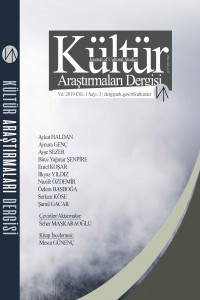Abstract
Birhan Keskin; dili, söyleyişteki samimiyeti ve ustalığıyla bir şair olarak çağdaşlarından ayrılır. Keskin, şiirlerinde ölüm ve zaman gibi varoluşsal problemlere değinir. Soğuk Kazı’da yer alan şiirlerinde yalnızlık ve ölümün dehlizlerinde gezinen
Keskin, zamanı sorgularken halk kültüründen, tarihten ve Yunan mitolojisinden
faydalanır. Keskin, Soğuk Kazı’da ateşle suyun zıtlığından yola çıkarak insanın dünyadaki
serüvenini şiirleştirir. Şair, toprak ve suyun, sıcak ve soğuğun birbirlerini tamamlayıcığını
jeolojik terimlerle ve halk söyleyişleriyle anlatır. Dünyanın meydana geliş ve insanın yaratılış macerası bir arkeolojik kazıyı andırır. Keskin, üç
bölümden meydana gelen (Soğuk Kazı, Dünyanın Katı Huyu, Soğuk Kazı) Soğuk Kazı’daki “Tüf”, “Soğuk Kazı”,
“Suyun üstünü kaplayan şeyler”, “Flamingo I”,
“Flamingo II”, “Flamingo III”,
“artık her şey tüccarların elinde” gibi şiirlerinde insanın yabancılık duygusunu,
uyumsuzluğunu, iletişimsizliğini simgeleyen ifadelerle yer yer rüya
atmosferi meydana getirir. Birhan Keskin, Soğuk
Kazı’daki birbirlerini tamamlayan, yalanlayan ve birbirlerine
gönderme yapan şiirleriyle dünyanın katmanlı yapısına uyum
sağlayamayan insanın mutsuzluğunu sözün katmanlarını aralayarak yansıtır. Gerçek ile rüya arasında
sıkışmış insanın derinleşen yalnızlığını şiirleştirirken dilin imkânlarını da zorlar.
References
- Bachelard, Gaston (1995). Ateşin Psikanalizi. (Çev: Aytaç Yiğit), İstanbul: Bağlam Yayınları.
- Bachelard, Gaston (2006). Su ve Düşler. (Çev: Olcay Kunal), İstanbul: YKY.
- Birhan Keskin Şiiri ve Ba-10. Altın Portakal Şiir Ödülü Sempozyumu (2008). Haz: Ahmet Tüzün, Yüksel Büyükuysal, İstanbul: Metis Yayınları.
- Çüçen, A. Kadir (2003). Heidegger’de Varlık ve Zaman. Bursa: Asa Kitabevi.
- Gölbaş, Alper, Başıbüyük, Zeynel (2012). “Anadolu Kültür Oluşumunda Tuzun Rolü”. Batman University Journal of Life Sciences, Volume 1, Number 1, 45-54.
- Keskin, Birhan (2010). Soğuk Kazı. İstanbul: Metis Yayınları.
- Necatigil, Behçet (2017). Mitologya. İstanbul: YKY.
- Tosun, Necdet (2006). “Tasavvufta Meyve”. Meyve Kitabı, Editörler: Emine Gürsoy Naskali, Dilek Herkmen, İstanbul: Kitabevi, 55-66.
Abstract
Birhan
Keskin comes to the fore from her contemporaries with her language, the
sincerity of the way of her speaking and her masterity. Keskin mentions
existential problems like death and time in her poems. In the poems that appear
in Cold Excavation, Keskin who navigates
in the tunnels of loneliness and death, questions time and while she does that
she benefits from folklor, history and Greek myth. Keskin poetises the
adventure of human in this world based on the oppositeness of fire and water
with geological terms and the way of speaking of the folk in Cold Excavation. The adventure of
creation of the world and human kind resembles an archaelogic excavation. In
the poems like “Tuff’”, “Cold Excavation”, “the things that covers on the water”,
“Flamingo I”, “Flamingo II”, “Flamingo III”, “Everything is in the hands of
merchants now” that appear in Cold
Excavation that occurs from three parts (Cold Excavation, The Strict Habbit
of The World, Cold Excavation), Keskin creates the atmosphere of dream in
places with the expressions that symbolises the feeling of strangeness,
disjointness, miscommunication of person. Birhan Keskin reflects the
unhappiness of person who can’t fit in to the layers of world while she
separates the layers of word with the poems that complating, lying and making reference to each other in Cold Excavation. While she poetises the
person who gets stuck between reality and dream, she pushes the posibilities of
language.
Keywords
References
- Bachelard, Gaston (1995). Ateşin Psikanalizi. (Çev: Aytaç Yiğit), İstanbul: Bağlam Yayınları.
- Bachelard, Gaston (2006). Su ve Düşler. (Çev: Olcay Kunal), İstanbul: YKY.
- Birhan Keskin Şiiri ve Ba-10. Altın Portakal Şiir Ödülü Sempozyumu (2008). Haz: Ahmet Tüzün, Yüksel Büyükuysal, İstanbul: Metis Yayınları.
- Çüçen, A. Kadir (2003). Heidegger’de Varlık ve Zaman. Bursa: Asa Kitabevi.
- Gölbaş, Alper, Başıbüyük, Zeynel (2012). “Anadolu Kültür Oluşumunda Tuzun Rolü”. Batman University Journal of Life Sciences, Volume 1, Number 1, 45-54.
- Keskin, Birhan (2010). Soğuk Kazı. İstanbul: Metis Yayınları.
- Necatigil, Behçet (2017). Mitologya. İstanbul: YKY.
- Tosun, Necdet (2006). “Tasavvufta Meyve”. Meyve Kitabı, Editörler: Emine Gürsoy Naskali, Dilek Herkmen, İstanbul: Kitabevi, 55-66.
Details
| Primary Language | Turkish |
|---|---|
| Subjects | Creative Arts and Writing |
| Journal Section | Research Articles |
| Authors | |
| Publication Date | December 13, 2019 |
| Published in Issue | Year 2019 Volume: 1 Issue: 3 |


